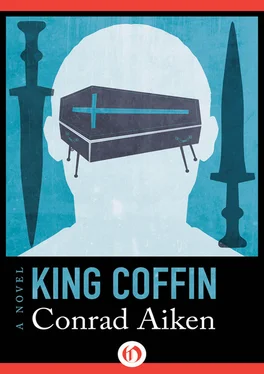He crossed Tremont Street, entered the drug store, found an empty telephone booth by the front window, and began dialing with the stem of his pipe. In the next booth a voice was saying but I can’t, but you see it would already be too late, I’m way in here at Park Street, a woman’s voice, peevish and whining, softened and made more nasal by the wooden partition. He half turned to listen.
— Hello?
— Ammen speaking. I wanted to be clear—
— Oh, Jasper; did you get my note?
Gerta’s voice was anxious, a trifle high-pitched. She was self-conscious.
— I wanted to be clear that there would be no one else there.
— Of course. If there’s any one else I’ll send them away. I thought that would be understood, my dear.
— All right. I’ll be there in fifteen minutes or half an hour. I don’t expect to loiter at the meeting, if I stay at all.
— Very well, if—
He cut off the phrase by hanging up the receiver. No doubt she was now saying Jasper, hello, Jasper, hello, hello, while already he clasped the brass handle of the door. He listened again to the voice in the adjacent booth — but I said I was in here at Park Street, yes, at Park Street — and then went out. Like all fragmentary or uncompleted remarks, as in fact like Gerta’s unfinished phrase, it had an oddly ominous ring, a ring of fatality; and one’s sense of power arose precisely from the fact that one could thus cut them off oneself. As one should.
And what now should be said to little Sandbach?
He walked rapidly with the beginnings of the sentences, touched them against his teeth lightly with the cool pipe stem, let them down with him from the curb in Bromfield Street to pick them up again on the other side, allowed them to be dispersed by the lurid placard of announcements in the lobby of the Temple and to fall behind him on the wide stairs. His shadow rose huge and high-shouldered on the bare wall of the second story, dislocated itself sideways, raised an immensely long arm, and vanished against the open door, from which came the sound of several voices in animated talk. His shadow had, in fact, gone in ahead of him, and he followed it into the room with the feeling of having an immense advantage.
There were half a dozen irregular little rows of folding chairs, and beyond these, by the little platform, Sandbach was talking with a few people, only a handful, it was clear that the meeting was a complete failure. Mrs. Taber was there, smiling her perpetual sweet smile under a pale purple bonnet, that immortal bonnet, and her husband the shyster lawyer, and Mrs. Hays the amateur psychoanalyst.
— Here he is now.
Sandbach crooked his elbow and pointed at him, pointed with his cigar, the dozen faces turned and looked at him with silent appraisal. They all seemed more than ever small and shabby, ridiculous, unreal, and as he bore down on them with his six feet two, stooping slightly forward, he was aware of playing Gulliver in Lilliput, his shadow was over them like a vast wing.
Sandbach, as always when he was a little frightened, smiled too much and looked cunning, his face seemed to be all width and no height, the eyes and mouth made long insinuating horizontals. Difficult to say where the Asiatic began and the Semitic left off, it was very fawning and subtle, no doubt about that, one could see in him the uneasy fertility which attracted Gerta.
— What do you think, Ammen, what do you say, the meeting is so small, it is a pity, this is our comrade Breault, shake hands with him, we thought as it was so small we wouldn’t try to have any speeches, but just have a little talk together, maybe. We could all go to my room in Allston Street. If you could come along, we were waiting for you.
Mrs. Taber put her skinny little hand on his arm, and cooed.
— Now do come, Mr. Ammen, I’m sure we need a little of your fine young cynicism!
He looked over their heads toward the windows, then round the bare and sordid little room with its air of cheap varnish, he remembered the excitement of his first meeting here, when it had seemed that something real and vigorous was being done, something dangerous and profound. It had suddenly shrunk to the size of his hand.
— No, Sandbach, I told you in my postcard that I was finished, I’m sorry, I just dropped in to tender my formal resignation. I’m afraid I no longer see any use in it.
— I see. He no longer sees any use in it. If he ever did!
— The sneer is gratuitous, but I had foreseen it.
— You had foreseen my sneer? I made no sneer, I think I merely stated a fact.
Mr. Taber began laughing offensively, then turned his back and walked away. Mrs. Hays, dressed in black, and as usual trying to look sibyline, put her head on one side and smiled condescendingly. Beneath their anger and hurt pride, of course, was their disgusting disappointment in losing his money, it was his own money which had paid for Breault. It was as if they were his employees, his servants, and he had dismissed them, their anger and hatred was slavish and cringing, they were clinging together against him.
— I didn’t come here to argue with you, but simply to make a statement. Unfortunately I find that neither your ideas nor your feelings have any reality or importance whatever. I’m afraid I was mistaken in you — or mistaken in myself, which comes to the same thing.
— Aren’t you carrying your subjective idealism pretty far? Now, Breault, you can see what happens when young men read too much Berkeley.
— I can assure Mr. Breault that your concern about my reading doesn’t interest me in the slightest. I think you’re all a little grotesque, it seems to me a little shameful that I ever thought I had anything in common with you.
— Very well, I don’t think we need to say anything further.
— You aren’t dismissing me— I’m dismissing you . I’ll be grateful, but not excessively so, if you’ll take my name off your mailing list, and send back my books. Good night.
He looked at Breault, who was embarrassed and blushing, and felt that he hadn’t yet done full justice to the situation. He laughed and put on his hat, then turned to Sandbach again.
— If you only knew how funny you are!
— Is anything to be gained from bad manners or impudence?
— Manners are of the mob, Sandbach, put that in your pipe and smoke it.
He swung his back to them and walked toward the door, a woman’s voice said why he thinks he’s God Almighty, Sandbach and Breault had begun laughing very loudly, somebody whistled turkey-in-the-straw. From the door he half turned and waved his hand. For a moment all the faces were quite still, it was like a photograph, and his final impression of them was that they were all hungry .
The evening had deepened, with the completion of this action, but again it was only as if the evening were a mere projection of himself, and its deepening, or his own deepening, was of course due to the very fact that the action had not been entirely satisfactory. It would have been better if he had made a formal address, a formal and drastic analysis: if he had dissected their pitifulness and futility before their very eyes, shamed them, horrified them. He could have quoted Martin—“I am sick of this oozing democracy. There must be something crystalline and insoluble left in democratic America. Somewhere there must be people with sharp edges that cut when they are pressed too hard, people who are still solid, who have impenetrable depths in them and hard facets which reflect the sunlight. They are the hope of democracy, these infusible ones.” To hell with their crowd-mindedness, their weak and slavish dependence on each other! What had their little anarchism to do with this? It was a contradiction in terms, an absurdity, they were themselves absurdities, and their unfitness was as clear in their sheeplike instinct of banding themselves together as in their sheeplike faces. Yes, this would have been better, he ought to have done it, but as usual his own sense of hurry — was it that? — had impeded him, his anger had produced the usual short circuit. At such moments one’s mere animal disgust became paramount, it was impossible to do anything but turn one’s back, it was a choice between that and killing them.
Читать дальше












